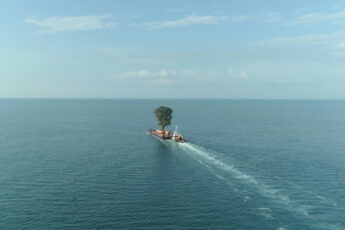Among Us
Monica Lăzurean-Gorgan, Michaela Kirst and Ebba Sinzinger’s Wood – Game-Changers Undercover (Wood – Der geraubte Wald, 2020)
Vol. 115 (May 2021) by Konstanty Kuzma
We tend to associate illegal logging with remote and idyllic areas far removed from the Western world. It is in places such as Brazil and Indonesia that mass-scale deforestation threatens the sustainability of our economic system, and more fundamentally, of human civilization. This is generally believed to be due to the poverty and lack of institutions of the regions involved. That illegal logging does nothing to alleviate structural poverty, that it capitalizes on and contributes to weak institutions by spurring corruption, and that its main origin are Western economic needs, is finally beginning to dawn upon some. But remote as these effects of our lifestyle are, they are easy to blank out, if not outright deny. In the globalized world of the 21st century, making such remote connections transparent has become one of the chief challenges of activist filmmaking. How does one illustrate that being offered a splendid buffet of capitalist consumerism – including IKEA furniture or even innocent-looking timber in hardware stores – has economic, ecological, political, and social repercussions across continents?
The answer given by the directors of Wood, a documentary about illegal logging, is that we don’t have to. The repercussions can be felt right at our doorstep, because that is where illicit deforestation also happens to be taking place, and on a massive scale. The female filmmaking trio of Monica Lazurean-Gorgan, Michaela Kirst, and Ebba Sinzinger follow Alexander von Bismarck, an activist from the Environmental Investigation Agency (EIA), as he helps unveil the illegal dealings of an Austrian company in Romania. The Austrian company is knowingly accepting illegal wood from Piatra Craiului National Park, which is felled and delivered to them by fellers and the so-called “logging mafia”. The arrangement is unveiled through high-risk activities, in which the EIA agent and his local colleagues pose as investors in order to elicit incriminating statements that are recorded with hidden cameras. The activists also follow a truck with an illegal load, whose delivery the police fail to prevent, which ultimately leads to one of the local activists being attacked with KO spray for documenting the whole affair on the premises of the company.
In many respects, the action-laden film thus inverts the premise of Christopher Nolan’s Tenet, in which an evil Eastern European travels back in time to destroy the world, a plan that is barely prevented by a US secret agent. In Wood, it is Eastern Europe’s nature that must be saved from Western corporations to rescue our future. (The film also takes us to fellow logging hotspots Peru and Siberia, though these two settings and their socio-political realities take up a lesser role than Romania.) Sadly, with EIA agent Alexander von Bismarck in the role of the savior, it is still a lone wolf from the US (notably, an ex-Marine) who promises to save the planet for us all. This is not only sad for the abstract reason that it again positions a Westerner in the role of the savior, suggesting that all problems – including those created by the West – can only be solved by more Western intervention (if the right one). It is also sad because the film thereby overemphasizes the role of von Bismarck as an individual in relation to his agency.
By focusing on von Bismarck’s perspective, the film also risks losing sight of the dangers local agents are disproportionately exposed to. When one of von Bismarck’s allies – a young Romanian entrepreneur who developed an app to help monitor illegal wood transports – wonders about the dangers they as international activists expose local populations to by generating media attention, the worry is shrugged off by a fellow activist, who notes that that particular situation is different, and that they promised the local population no more than to tell their story (in that particular case, the discussion takes place in the Peruvian rainforest). I do not see how this answers the entrepreneur’s totally legitimate point. It is also questionable if all of the agents working for the logging companies involved – as subcontractors, sub-subcontractors or perhaps even on a completely informal basis, as happens on the end of the food chain – really had to be shown without anonymization. Though it seems inevitable that the exposure of illegal activities will lead to unintended consequences, I do not see why the film could not have made a bigger effort to minimize them. What does it help Western audiences to see the face of a truck driver delivering illegal wood, when clearly, he is just as unimportant to the business at large as individual drug dealers are to the drug business?
Overall, however, the film does well in killing the myth that the problems of our time lie in some remote part of the world. With an Austrian corporation and a national park in Romania at the heart of the film’s conflict, both the aggressor and the aggrieved are situated inside the EU and thus within the realm of what is considered sound and functioning. (Of course, Austria and Romania have their own colonial history and thus replicate very similar power dynamics to those instantiated by Western companies deforesting the Peruvian rainforest, but this is successfully concealed by the narrative of European “integration”.) The film follows a general trend of reminding us that the invisibility of precariousness and environmental destruction is not just a function of spatial distance, but also of ignorance. Parcel deliverers, toileting staff, workers in Amazon warehouses or meat factories are as close to each of our homes as is the continued encroachment of civilization on preserved nature. That outsourcing may reach even higher numbers should not worry the directors of Wood, for total outsourcing is still far away in those areas where it is possible, and altogether unthinkable in others. And while the focus on Alexander von Bismarck brings up post-colonial problems of representation, it solves others pertaining to the medialization of progressive causes. Even after having thought about this film a great deal, I can’t help but admire von Bismarck’s no bullshit attitude that seems nearly immune to vanity and self-portrayal. If there is a secret agent I’d like to be, it would be him, opposed as he is to the powers that rule: modest, resolute, and average-looking.




Leave a Comment